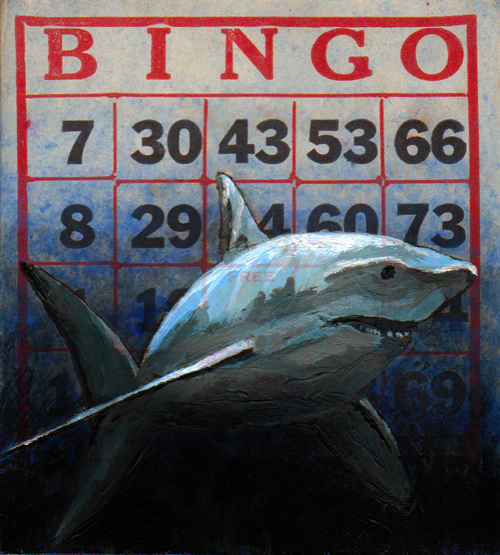 Chris broke his back in Pennsylvania. It happened before I met him, before he showed me with pride the SS uniform his grandfather had worn during WWII, before he tipped our Waffle House waitress a fifty-dollar bill. Before we ran out of crack cocaine. Before I came along for the ride.
Chris broke his back in Pennsylvania. It happened before I met him, before he showed me with pride the SS uniform his grandfather had worn during WWII, before he tipped our Waffle House waitress a fifty-dollar bill. Before we ran out of crack cocaine. Before I came along for the ride.
He made a sloppy left-hand turn onto Pine Street, the car’s high beams smearing light across dark, overgrown lots. I had no idea where we were. I didn’t live in this town. Neither did Chris. But finding drugs boils down to the same stark equation: poor neighborhood + cash = a seller who has what you’re looking for.
Chris was 6’4″, 350 pounds. Behind the wheel of the Civic, he was a teddy bear crammed into a fishbowl. He talked about why he’d make a good drill sergeant. His father had been a SEAL, he said. I already knew that, but you never told people like Chris that they were repeating themselves.
”Where is everybody?” he said. Chris carved a U-turn in the cul-de-sac, under the sick ochre light of Pine Street’s only working streetlamp. ”I know they’re out here,” he said. ”Probably the car. This thing screams narc.”
We slowed down. The headlights caught yard reflectors and the watching eyes of animals. Farther in, someone on an unlit porch smoked a cigarette, its tip streaking the darkness like an orange meteor.
I was indifferent to the goal of our trip. I had got into the car, more or less, out of personal credo, a self-stipulation that I could maintain conversation with anyone, be it crack addict, evangelist, or yacht owner.
“I knew they weren’t on vacation,” said Chris. At the mouth of a driveway stood a man in jeans and T-shirt, drinking from a paper bag. As we got closer Chris rolled down the passenger window and spoke across my lap: “Hey man, you got any rocks?”
The man didn’t look at us. He lifted the paper sack to his face. I could see his Adam’s apple. It looked like an arrowhead stuck in his throat.
“Yo,” said Chris. He took a quick survey of our position, twisting his cramped body to get a view from all four sides of the car. “Sorry to bother you.”
“Pull around,” the man said.
We drove to the stop sign where Chris executed another U-turn. He cut the car’s lights. At the driveway the man waved us on, so we continued to the cul-de-sac. “I hate cul-de-sacs,” Chris said.
This time the man was in the center of the street. Gone was the paper sack. Chris rolled down his window. I checked the view from all four sides of the car.
“Forty,” said the man in the street.
“That’s all you got? I need sixty.”
The man reached into his pocket and held out his palm. “I can’t see that shit,” Chris said. “Fuckin’ Tic Tacs for all I know.” The man stepped closer, his hand almost inside the car. Chris said OK. He held out the money, bills rolled into a drinking straw that poked from his right fist. As they made the exchange, Chris suddenly gunned the engine. The Civic’s tires squealed, its direction uncertain, as Chris struggled to pull both of his hands back into the car from the grip of the man he was robbing. For a few yards, the man ran alongside the car, cursing, trying to slap the money straw out of Chris’s hand.
Chris made loud, choppy laughter, as he ran the stop sign. He rolled up the window then re-shifted his bulk. “I think,” he said, clicking the headlights back on, “that the military would straighten me out. I need to be straightened out.”
I was ducked down in the seat. I had expected gun shots. I asked him if he were crazy.
“Geez, man, lighten up. What’s he gonna do? Call the cops?”
I straightened up. My heart was still in my ears. “Problem is,” said Chris, “is that I’m an ex-felon. And I’m too old.” He handed me the green drinking straw. “Trust no one. Including me.”
I rolled down my window. In the sky over the town the light was pink. I could now say I’d been there, wherever that was, though I’d be able to recognize it only in the dark.
Chuck Strangward lives in Sylvester, Georgia, and works as a rural postal carrier. The first literary journal he has submitted to is Brevity.
Illustration by Marc Snyder

8 comments
Steven E.A. says:
Jun 10, 2012
You’re a braver soul than I! Also, while you can maintain conversation with anyone, I have the opposite problem. I enjoyed your perspective!
Adam says:
Jun 12, 2012
Nice work! The pace is quick but smooth, and these snapshot images are golden (“teddy bear crammed into a fishbowl”).
Keep up the excellent work. :0)
Christine Steele says:
Jul 6, 2012
Lovely writing! Great ending.
Rachel says:
Jul 8, 2012
I love this. Great tension and character.
efriend says:
Jul 13, 2012
This rocks. Please write more.
Isha says:
Aug 6, 2012
The scene of the exchange is so thrilling and real. Great piece!
Eben Pindyck says:
Oct 19, 2012
Great stuff. Keep writing and submitting.
Barnstorm » Blog Archive » Nonfiction Pizza Party says:
Oct 30, 2012
[…] For their spring 2012 issue, Brevity has launched a new website, really a streamlined version of their previous setup. The 16 essays in the latest issue are tongue-in-cheek, lyrical, minimalist, and heartbreaking. The issue’s best metaphor is even better out of context: “He was a teddy bear crammed into a fishbowl.” […]